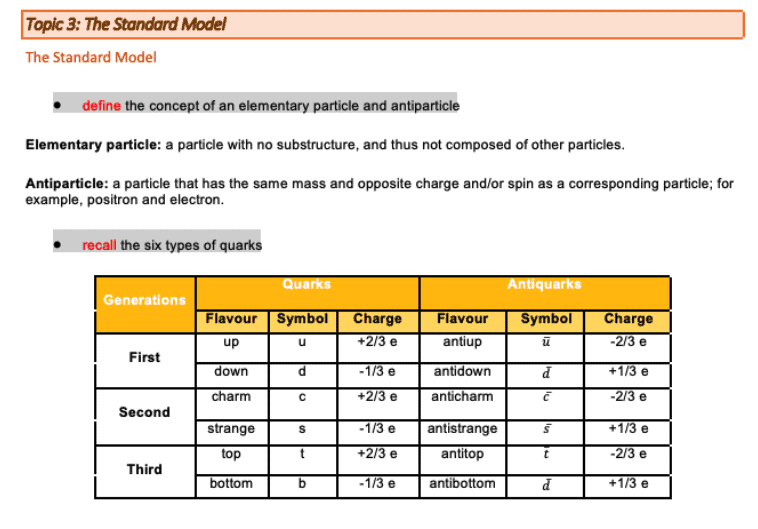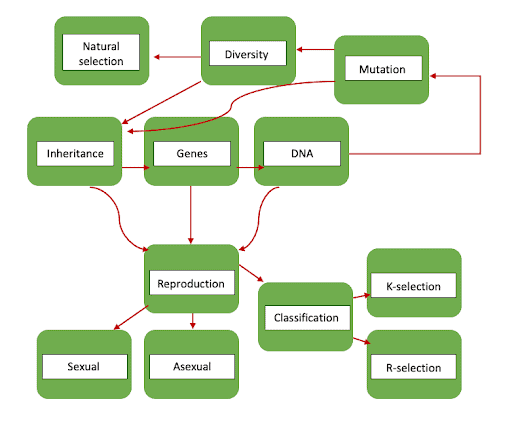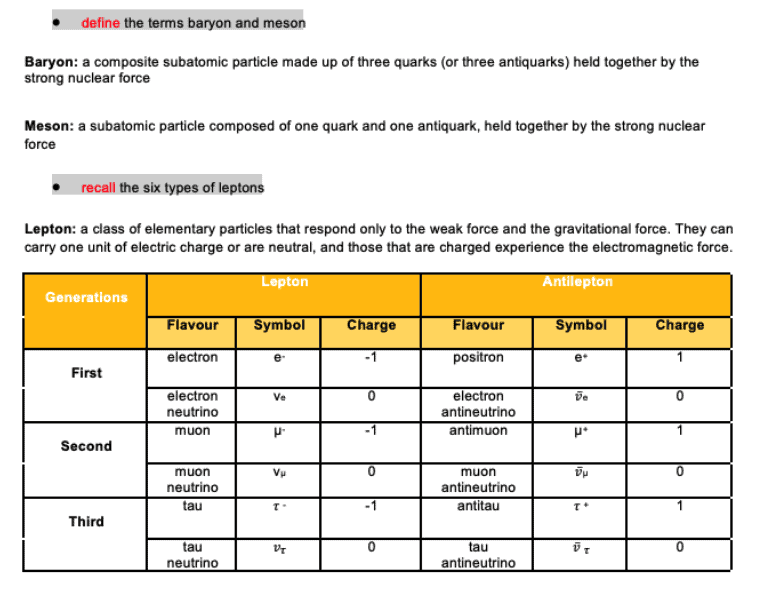Having good notes is grossly underrated, especially if you’re studying a Science subject during Senior School!
For me, my notes were my saving grace throughout Year 12 and I honestly believe that they were the key to my success.
That being said, there is a lot that can go wrong in the note-taking process, and it is quite common to pick up some rather inefficient habits throughout school.
Keep reading to discover our tips for crafting awesome notes for any Science subject in the QCAA!
Tip #1: Break Down the Syllabus
Tip #2: Pay Attention to the Cognitive Verbs
Tip #3: Use the Syllabus as a Structure
Tip #4: Get Started Early!
Tip #1: Break Down the Syllabus
Understanding your syllabus is key. It will be hard to take notes if you aren’t 100% sure of what you are meant to be learning.
At the beginning of the year, go through your syllabus with a fine tooth comb and become very familiar with it. This document, while quite lengthy, should be your best friend and one of your first port-of-calls when you are confused about any content.
It can help make clear how in-depth you need to study a topic — which can save you countless hours of studying!
Using Mindmaps
Now, I’ve said this before in a few other articles but I’ll say it again, mindmaps are the way to go! In Science subjects such as Biology and Psychology, the content links together quite nicely.
You could make a web linking all of the topics/ideas/concepts from the beginning of Unit 3, right through to the end of Unit 4. Making these connections and writing them out in the form of a mindmap is a fantastic exercise.
By doing this you are creating more associations in your brain, making it easier to recall information.
Further, sometimes when you’re studying, you may not feel like reading through large chunks of text. Having a mindmap on hand is great for those occasions as you can still review the content and think deeply about its greater meanings.
Tip #2: Pay Attention to the Cognitive Verbs
The syllabus is great in that it indicates, very clearly, just how in-depth you need to understand the content. It does so through the use of cognitive verbs.
These are your “explain”, “discuss”, “recall”, “describe”…
Essentially, if you are asked to “recall” something, you are not being asked to write a big paragraph about that something (oftentimes you can get away with just a couple of words). If you were asked to “discuss” something, however, then you are expected to produce a much longer response.
Note that when asked to “define” a term, QCAA will expect a particular definition. You can find these definitions in the glossary at the end of each syllabus.
These are the exact definitions you need to know — not some random definition you find on Wikipedia.
Why are the Cognitive Verbs important?
By catering your notes to the cognitive verbs it ensures that you will not write too much for topics that you aren’t expected to know a whole lot for. This will save you a lot of time as it can be quite easy to waffle on while note taking.
Additionally, it is likely that you will have the exact answer to some questions on the external exam just sitting in your notes.
Occasionally, QCAA will copy and paste a syllabus point or two into the exam and use it, word for word, as a question. Therefore, by having these good notes that are tailored towards the cognitive verbs, there is a good chance that you have already answered a couple exam questions (that you may actually see) before you walk into the exam room.
This would most likely be the case for “define”, “describe”, “identify”, “recall”, and “explain” type syllabus points.
How should you layout your notes?
Something I’d like to stress also is that your notes don’t have to look like traditional notes.
If you find colour coding helpful, do it. If you like diagrams (I highly recommend diagrams where possible), add them in.
It’s okay to have sections of your notes that don’t have any words and are instead communicated through images. It’s important that you take a holistic approach to your learning, and do what is best for you.
For any calculation-type syllabus point, don’t worry about writing big chunks of text. Instead, write down some worked examples, for different variations of a problem and at differing levels of difficulty.
Tip #3: Use the Syllabus as a Structure
Something that made my life so much easier in Year 12 was the copy and paste function on my computer. Now, this is one of the few times I will condone copying and pasting — copy and paste the syllabus points onto a blank word document (separate the syllabus points into their respective topics and subtopics for ease of comprehension).
Personally, I had a word document for all of Unit 3 and one for all of Unit 4, for each of the three Sciences I studied.
Once you have done this, you can simply fill your notes in underneath each point. This will help you to ensure that you haven’t missed any of the content and that you have learnt everything you are expected to know.
Below is an example of how my notes looked for Unit 4 Physics.

Tip #4: Get Started Early!
My last tip would be to get started early. Taking good notes requires some time — additionally by getting started early, you are giving your brain more time to absorb the content and make sense of what you have learnt.
This should (fingers crossed) save you from those horrible last minute cramming sessions.
Ideally, you should be writing proper notes as you are working through the content. Or, if you wish, you can work ahead of your teacher — giving you the opportunity to ask more in-depth questions during class and further refine your understanding of the content.
Review our Term 3 Content Guide to make sure you’ve covered all the relevant topics!
What are the benefits of starting early?
One of the perks of starting early is that it gives you more time to think, process, and ask questions. Rather than leaving all your questions for the weeks leading up to the exam, you can consolidate your understanding as you go.
By having a good understanding from the beginning, you are saving yourself from trying to pick things up last minute. This means that in the weeks leading up to the exam, instead of learning the content or practising basic questions, you are able to tackle harder, more thought-provoking questions (questions that will best prepare you for the exam).
In Year 12, I was able to finish all of my notes for my QCAA Science subjects by the end of Term 2/beginning of Term 3. This gave me plenty of time to refine my understanding of topics I found tricky and do plenty of practice exams.
Wondering which Brisbane schools perform well in academics? Our Ultimate Brisbane ATAR School Ranking List will tell you everything you need to know!
Are you looking for some extra help with creating your QCAA Science notes?
We have an incredible team of QLD tutors and mentors!
We can help you master the syllabus for your Science subjects and ace your upcoming assessments with personalised lessons conducted one-on-one in your home or online!
We offer school science tutoring in Brisbane! Check out our face-to-face or online options.
We’ve supported over 8,000 students over the last 11 years, and on average our students score mark improvements of over 20%!
To find out more and get started with an inspirational QLD tutor and mentor, get in touch today or give us a ring on 1300 267 888!
Katelyn Smith was a pioneer in the Queensland ATAR system. After graduating in 2020 with an ATAR of 98.40, she now studies a Bachelor of Advanced Science (Honours) at The University of Queensland — majoring in Physics. Through her studies, she hopes to develop a greater appreciation for how the wonders of the universe work. When she isn’t slaving away behind her unnecessarily large textbooks, she enjoys catching up with friends, scrolling mindlessly through TikTok, and sleeping.





